

 |
 |
How I Broke into the Businessby Edward M. Kimball
|
 |
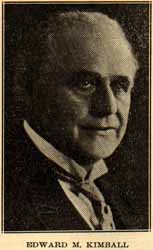
When quite a young lad (I was about fourteen years of age) and being musically inclined, I joined the Baraboo band, playing concerts. I advanced very rapidly as a musician, and at the age of eighteen I was playing solo cornet, and I was destined to become a rival (in my own estimation) of the then famous cornetists, Liberati, and Arbuckle.
It was about this time that Al. Ringling, the elder of the brothers, "blew" into town on a visit to his parents. His father at that time was engaged in the harness business in Baraboo, and nearly all the boys were busily working at their trade as harness makers in their father's shop. Being on very friendly terms with the other boys I had induced them to also join the band and offered to teach them the rudiments of band music, so Alf. T., and Charlie, under my tuition became very proficient as "wind jammers" also.
I met Al. one day at their home, where I had been invited to dinner, and he was very enthusiastic about starting a little "show trick" and go on a tour. He had four others lined up; a violinist, Jay Prothers, who was also a fine cornetist, Harry Wallace, a black faced comedian, who also did Irish, Dutch, and other character impersonations, and also a baritone player.
Al. had pleaded with his father to let his brothers go with the show, but the old gentleman was adamant to his entreaties, declaring that the boys must finish their trade and schooling before embarking on a "wild goose chase", as he called it, and his decision was a wise one. He "knew his onions", as our experiences the next few months on the road proved.
However nothing undaunted, Al. succeeded in getting together what he called (and we all agreed with him) a classy and peppy little concert company, and we had originally intended to call it the Quintette Concert Company, and we had our bills all printed, and tickets made out with that name as there were only five of us, then it so happened that a musician by the name of Ed. Warn wanted to go along with us, so that made a sextette. However we never changed the name. Here was our roster:
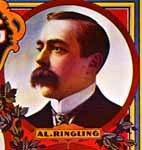
Al. Ringling (appearing under the nom de plume of A. B. Trimmer), manager, singer, slack wire performer, juggler, and bass drummer. Prof. Jay Prothers, solo violinist and cornetist, leader of the band. Harry Wallace, comedian, singer and baritone player in band. Freddy Hart, black face comedian, singer, clog dancer, and drummer. Ed. Warn, violinist, alto horn in band, and all around performer. Ed. M. Kimball, pianist, vocalist, straights, and cornetist.
We had a pretty good programme lined up, and as the bills said, it was a "grand galaxy of talent." We rehearsed faithfully for several weeks, until the night before our departure, when I told Al. that I didn't know how I was going to get away without my parents consent. They were very religious and I felt that they very much opposed my going into the theatrical business. However, I assured Al. that I would manage to set away by some subterfuge or other.
I finally made up my mind to run away without my parents consent. The night of our departure was set for 10:00 P. M., so after dark I secretly placed a ladder up to my bedroom window, and after family prayers, I went up stairs, ostensibly to go to bed, but I hastily packed what few things I needed to carry me over my momentous undertaking, then when I felt that Dad and Mother had gone to bed I quietly raised my window, climbed down the ladder, and was about to make my get-a-way, when I felt a hand upon my shoulder and my Father's kindly voice inquiring, "Where are you going, my boy?" Realizing that candor was the best policy, I unflinchingly told him that I was going away with a show, and I did not want to worry him or my mother with the annoyance of a more formal departure, and that I had intended to write them the next day and inform them of my whereabouts, knowing that they would be deeply concerned by my unexpected absence.
He asked me if I had any money to bring me back in case I got stranded on the road, and I confidently told him that we expected to make a lot of money and that I would be able to send him at least $10.00 every week.
Well, he finally persuaded me to go in and bid my Mother goodbye, which I did, and then after a most tearful and repentant parting, my Father handed me two ten dollar bills, and said, "you may need this." Then after an affectionate goodbye, and a God speed you, I left that sweet home, and dear parents, for a life of uncertainty, with my boyish heart full of hope and ambition, yet with a feeling of regret that the very thing for which I had craved and for which I had feared to ask them for, had been so freely and graciously given me.
It was nearly time for the train, and I ran all the way to the depot, and Al. and the rest of the company were anxiously awaiting my arrival. I told Al. of my experiences and showed him the money my Dad had given me and he was greatly elated, as I found out afterwards that he, as well as the rest of the company, had very little money, and our first stand, the little town of Lodi, Wisc., proved to be almost our last, for the spring rains had started early and killed our business and we played to about $3.00, net--"not so good" Eh? Well the upshot of it was that there was not enough money to pay our hotel expenses and car fare to the next town. The hotel man was satisfied to take Harry Wallace's Stradavarious violin, an instrument that was valued at three hundred times the amount of his bill, but the landlord promised to hold it for a year, so everybody being satisfied we wended our way to the next town. Another "burg" and business worse than ever. My other ten simoleons went to pay our fares to the next town, while the landlord was content to take as security our bass fiddle, we called it the "dog house." The next town was much better. We made a little money and were quite encouraged, but a letter from the agent asking for money came and a small amount was sent to satisfy him and we went on to the next town. Business being pretty fair for a week following we made our way, then the spring rains set in for good and we were nearly swamped.
With grim determination and cheerful hearts we let our band instruments go to pay bills, and took a landlord along on a vacation trip so that he could collect his bill in the next town, then we added a livery man to our company. At one time we had a livery man and two landlords with us, one of them a very good singer, and we induced him to go on and do a specialty. He made a very big hit and after he had received his money and left us, we heard that he had joined an operatic company and afterwards became quite an actor and an internationally famous artist. His name I withhold for personal reasons, suffice to say that his name became a household word fifty years ago.
On, on we went, getting further in debt, and with our band instruments all gone, we were forced to borrow instruments from town bands to give our parade and our show, and we were forced to walk from town to town, but we were all cheerful, with never a murmur from anyone, until at last the crash came, and we could go no further, so after a wild adventurous, and unprofitable season of three months filled with disappointment, loss of our instruments, to say nothing of the money we owed to landlords, livery men and others who were kind enough to aid us financially, we were forced to disband, and as for myself, I jumped a freight train bound for Baraboo, and arrived there and was received by my father with open arms, as the prodigal son, and he was actually proud that we had stayed out so long. After I had related our most harrowing experiences he gave me $10.00 more to send and get my cornet that I had put up for railway fare for the company during one of our strenuous predicaments.
Baraboo, Oh, how good the old town looked to me, but my ambition
was not killed, merely kindled, and we went out intermittently, 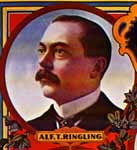 but
always with the same success, --FAILURE, But our mistakes proved a lesson, and about two or
three years later, after we acquired more knowledge of a practical nature, and having been
with big companies; Al. and I met again in Baraboo.
but
always with the same success, --FAILURE, But our mistakes proved a lesson, and about two or
three years later, after we acquired more knowledge of a practical nature, and having been
with big companies; Al. and I met again in Baraboo. 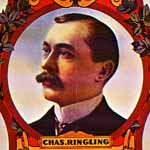 Alf.
T. and Charlie Ringling had organized a little band in that town, and were giving a concert
in the park one night. After the program was over Al. walked over to the band hall with me
and said, "Ned, old boy, what do you say to organizing another show and take the boys
out? I think I can persuade my dad to give his consent to the boys going along. They are now
of legal age anyway and can choose for themselves. So, acting on his suggestion, we organized,
naming it, "THE RINGLING BROTHERS CLASSIC AND COMIC CONCERT COMPANY." This was the
first show bearing the now famous name.
Alf.
T. and Charlie Ringling had organized a little band in that town, and were giving a concert
in the park one night. After the program was over Al. walked over to the band hall with me
and said, "Ned, old boy, what do you say to organizing another show and take the boys
out? I think I can persuade my dad to give his consent to the boys going along. They are now
of legal age anyway and can choose for themselves. So, acting on his suggestion, we organized,
naming it, "THE RINGLING BROTHERS CLASSIC AND COMIC CONCERT COMPANY." This was the
first show bearing the now famous name.
It is hardly necessary to dwell upon their success as the whole world knows of that, and their reputation for running a clean show, with honest and upright principles, keen and discerning business methods, have been the talk of the nation.
I never traveled with them after they merged into the circus business,
but I often met them on the road, and visited their headquarters
when they were living in Baraboo,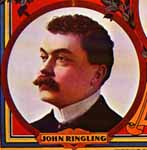 and many times have I talked over the old times with them, and particularly Al. who has now
passed on, and now after half a century of success there is but one of the brothers still
remaining and that is John. As a tribute to their memory let me say, "They were all born
showmen, honest, conscientious, and keen, far-seeing business men, who realized what the public
wanted and gave it to them, and they left a most enviable record in the great annals of circusdom.
and many times have I talked over the old times with them, and particularly Al. who has now
passed on, and now after half a century of success there is but one of the brothers still
remaining and that is John. As a tribute to their memory let me say, "They were all born
showmen, honest, conscientious, and keen, far-seeing business men, who realized what the public
wanted and gave it to them, and they left a most enviable record in the great annals of circusdom.
But to dear old Al., the elder, the keen, shrewd brained originator of that world famous
name, I give the palm. 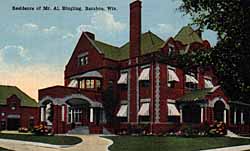 That
dear, lovable man, who was as an elder brother to me in my debut in the business, he had a
most retentive memory, and he never forgot any kindness or courtesy shown him in his days
of adversity, and though some years had elapsed after those strenuous times which marked the
beginning of his career as a showman, he kept a diary and marked down all money he had accepted
from sympathizing friends, indulgent landlords and liverymen whom he had been unable to pay,
and when he was meeting with his well deserved success, he paid all those bills, with interest,
and gave his benefactors life passes to Ringling Bros. World's Greatest Shows. A man who endeared
himself to all who came in contact with him, and I can but add the Latin motto: "Palmam
Qui Meruit Ferat" (Let him who won it bear the palm.) I don't think there is a soul living
that will not bear me out in my assertion that he was, "THE NOBLEST SHOWMAN OF THEM ALL."
That
dear, lovable man, who was as an elder brother to me in my debut in the business, he had a
most retentive memory, and he never forgot any kindness or courtesy shown him in his days
of adversity, and though some years had elapsed after those strenuous times which marked the
beginning of his career as a showman, he kept a diary and marked down all money he had accepted
from sympathizing friends, indulgent landlords and liverymen whom he had been unable to pay,
and when he was meeting with his well deserved success, he paid all those bills, with interest,
and gave his benefactors life passes to Ringling Bros. World's Greatest Shows. A man who endeared
himself to all who came in contact with him, and I can but add the Latin motto: "Palmam
Qui Meruit Ferat" (Let him who won it bear the palm.) I don't think there is a soul living
that will not bear me out in my assertion that he was, "THE NOBLEST SHOWMAN OF THEM ALL."
Compiler's note: Edward M. Kimball is the father of the well known star of the stage and movies, the beautiful Clara Kimball Young.